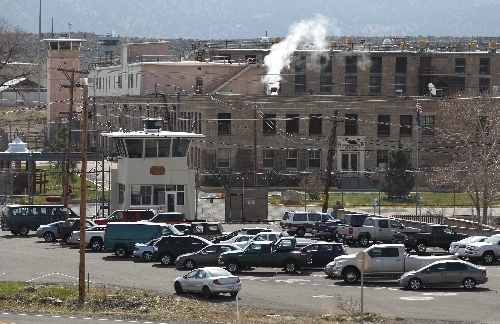Parole changes would cut costs

CARSON CITY — The Nevada prison system wants to tighten its belt by opening its doors.
Two measures under consideration by the Nevada Legislature would reduce the state’s prison population by releasing some nonviolent convicts earlier and by changing sentencing guidelines for others serving consecutive sentences to make them eligible for parole sooner.
Connie Bisbee, chairwoman of the Nevada Commission of Parole and Probation, said one of the bills would mean that at least 517 people currently serving time for such crimes as burglary and shoplifting could immediately be considered for early release.
The other cost-cutting measure would have saved an estimated $1 million — based on last year’s costs of housing criminals in Nevada’s nine prisons. The state currently faces a $2.5 billion budget gap.
‘GOOD-TIME CREDITS’
Under AB136, Class B felons, including white collar criminals, would be able to earn "good-time credits" to shave off time from their minimum sentences. Prisoners could earn the credits through such efforts as acquiring vocational skills or undergoing drug treatment programs.
Offenders guilty of violent crimes, sexual assault and repeat offenders would not be eligible.
Legislation passed in 2007 offered good-time credits to those convicted of grade C, D and E felonies, which include grand larceny, robbery, possession of controlled substances and failure to pay child support.
Assemblyman William Horne, D-Las Vegas, said the new bills would give early release opportunities to inmates guilty of lesser crimes.
"We could relieve some of the prison population and the cost to the state without increasing the risk to the community," Horne said.
Horne said Class B felons are the largest part of Nevada’s prison population.
SB265 would reduce the prison population by doing away with consecutive sentences — as long as none include life without parole — and pooling minimum and maximum terms.
HOW CHANGE WOULD WORK
To show how this would work, Bisbee gave an example of a convict who is serving time for four sentences that each carry terms of four to 10 years.
Bisbee said in this scenario an inmate does not know how long he will be in prison. If denied parole on the first charge, the next sentence will not kick in until after the first sentence terms out or if parole is granted at a later date. If parole is granted, the inmate would technically be on parole but would in fact remain in prison while the second sentence begins. And so on to the third and fourth sentences.
Those staggered start and stop dates are costly and discourage prisoners from seeking self-improvement programs like drug treatment or higher education because they simply regard parole hearings as the next step in their incarceration, Bisbee said.
Under SB265, the inmate would serve 16 years — the total of the minimum sentences for each charge — before being considered for parole.
Bisbee said SB265 establishes clear expectations for victims and inmates. She said a definite date could encourage an inmate to settle in and realize "if he wants to have a good chance of getting paroled after he has served his 16 years, he should really address his addiction. He attends programs and gets a job with prison industries."
SIGNIFICANT SAVINGS
Bisbee estimated the state would have saved almost $1 million last year if even 10 percent of the people who were denied parole had come in under SB265’s delayed review. The estimated savings come from not having to feed and provide medical care for the released inmates.
Nevada was bracing for a 60 percent jump in its inmate population within five years and the need to build more prisons when it sought to trim costs in 2007.
Incarceration rates have consistently been higher than other states. Analytical firm JFA Associates notes in a 2011 report that Nevada’s prison population rose 3.4 percent annually from 2000 to 2008 while the rest of the country averaged about 1.5 percent each year during that same period.
According to Prison Count 2010 by the Pew Center on the States, the reform legislation saved Nevada $38 million in operating costs and $1.2 billion in construction costs.
Horne, who chaired a committee that reviews the state judicial system and makes recommendations for improvements, said the support for the current legislation is largely based on the success of the 2007 program.
PHILOSOPHICAL SHIFT
Without AB510 the state would not be in a position to consider closing Nevada State Prison. Estimated savings with the closure are $16 million over the next two years.
"Imagine if 510 had never happened. Where would we be moving the various inmates? Right now we have enough beds in the prisons throughout the state. We’re able to do that because of 510," Horne said.
The ACLU of Nevada said proposals like AB136 reflect a shift in attitude that is motivated by finances. Rebecca Gasca, ACLU legislative and policy director, said that beyond AB136, Nevada is considering measures such as AB142, which upgrades the amount of money that constitutes grand larceny from $250 to $650.
Gasca such the proposals are a philosophical shift with a hard-nosed undercarriage.
"Now we see that we can combat this mass incarceration with more sensible policies that cost less and are more effective," she said.












